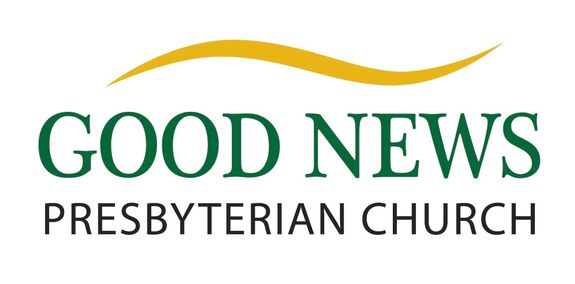We seek to worship God in a way that is joyful, reverent, and God-centered. Because God is pleased to work through Scripture to transform lives (Hebrews 4:12), our pastor preaches through books of the Bible and seeks to equip members to understand and apply the Scriptures on their own. We seek to communicate the logic of what we do in worship to those without a Christian background. One of our new members said, "I appreciate being able to go to a church that opens the Bible and helps us understand it without making us feel inadequate."
A Guided Tour of Our Worship Services
The worship services at Good News Presbyterian church have three foundational traits:
- They are biblical -- We do the things we do in worship not because "they work" or because people like them, but because the Bible commands us to include these elements in our worship. In addition, all of the elements of our worship service are expressions of the Word of God: We read the Word, preach the Word, pray the Word, sing the Word, and in the sacraments we see the Word.
- They are dialogical -- Worship is a dialogue between God and us. God speaks to us through the reading of Scripture, through the faithful preaching of the Bible, through the announcement of pardon and the benediction. We speak to God by praying in word and song, by saying to him what we believe, and by confirming our allegiance to him in the sacraments
- They follow a gospel logic -- There is a movement in our services from God's greatness to our guilt to God's grace to our gratitude. We begin the service by praising our great God. This leads us to confess our sins and receive God's forgiveness in Christ. Then we grow in faith by the means of grace (prayer, the reading and preaching of God's Word, and the administration of the sacraments). We conclude with thanksgiving and God's blessing.
Bracketed by a prelude and postlude, the following elements are found in our corporate worship services:
Prelude: When the prelude music plays we should quietly reflect and prepare for the great work of worshiping God. Meditation on Scripture or reading over the words of hymns used in the service is often helpful.
Call to Worship: A scriptural statement summons us to worship God.
Singing: We sing hymns and songs that are reverent, substantial, and focused on God. Since the book of Psalms is the hymnal that God gave to us, we sing a psalm each Sunday (Colossians 3:16).
Invocation: This opening prayer praises the triune God and calls on Him to be among us.
Confession of Faith: We often say together historic confessions of faith or creeds (e.g. the Apostles' Creed). These corporate declarations of belief confirm that we worship according to the "pattern" of "truth" (II Timothy 1:13; John 4:24) revealed in Scripture.
Confession of Sin and Announcement of Pardon: We acknowledge, renounce, and turn from our sin and then hear the good news that in Christ, God forgives the repentant (Psalm 32 and 51; Isaiah 6:1-8).
Pastoral Prayer: This is a prayer of petition for civil authorities (I Timothy 2:1-2), for the ministry and mission of the church (Matthew 9:36-38), for the salvation of unbelievers (I Timothy 2:1,3-4), for the sanctification of Christians (Colossians 1:9-11), and for the comfort and healing of the afflicted (James 5:13-18). We seek to pray prayers that reflect the themes, priorities, and language of Scripture.
Scripture Readings: We usually have corresponding Old Testament and New Testament readings, reflecting the pattern of Old Testament promise and New Testament fulfillment (I Timothy 4:13).
Offering: Giving tithes and offerings to support the ministry and mission of the church is a tangible act of worship (Malachi 3:10; I
Corinthians 16:2).
Sermon: Our pastor typically preaches through books of the Bible, explaining the original context and intent of each passage, and then making legitimate applications of it to our lives (Nehemiah 8:1,8; I Timothy 4:13).
Sacraments: The sacraments of baptism and the Lord's Supper make visible to the senses what Jesus has done for us. He has washed away our sins. He invites us into his presence and spiritually nourishes us.
Benediction: The benediction (literally, "good word") is a blessing from God, taken from Scripture, in which we hear the good news of God's favor upon us in Christ.
Postlude: Celebratory music is played after the service as our worship overflows into a time to greet one another and deepen friendships.
Though our worship services are not designed to entertain, the blessed outcome of God-centered worship is satisfying to our souls. But to be blessed by God-centered worship you must prepare before the service and you must be engaged during the service, making the words of the prayers and songs your own, attentively listening to the reading and preaching of God's Word, and praying for the Holy Spirit to work in your heart.
"The greatest single contribution which the Reformed liturgical heritage can make to contemporary Protestantism is its sense of the majesty and sovereignty of God, its sense of reverence, of simple dignity, its conviction that worship must above all serve the praise of God."
- Hughes Oliphant Old
- Hughes Oliphant Old
“To worship God we must know who God is, but we cannot know who God is unless God first chooses to reveal himself to us. God has done this in the Bible, which is why the Bible and the teachings of the Bible need to be central in our worship.”
- James Montgomery Boice
- James Montgomery Boice

